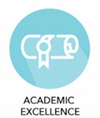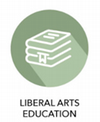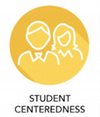Employee Recognition Program: Cistern Standard
Embodying College of Charleston's Core Values
The College of Charleston embraces a culture that supports our Core Values. The Cistern Standard is a recognition program that provides a way for the College to build on this culture and spotlight employees who embody behaviors in accordance with our Core Values. Employees may recognize a fellow employee of any title or department at College of Charleston.
Program Overview
Eligibility:
- To be eligible to receive recognition, the employee must be employed with the College for a minimum of 90 days.
Program Administration
- Kendall Cage (cagek@cofc.edu) with the Office of Equal Employment Opportunity Programs is responsible for the administration of the Employee Recognition Program.
Program Provisions
Recognition observed must be a behavior that exhibits one of seven College of Charleston core values.

Integrity: Takes accountability for their actions. Adheres to the highest ethical standards in all professional obligations and personal responsibilities. Demonstrates respect for self, others, and place.

Academic Excellence: Show commitment to a dynamic intellectual community, high academic standards, strong academic programs, exceptional teacher-scholars. Exhibits behavior that engages students. Exhibits behavior that promotes lifelong learning.

Liberal Arts Education: Encourages intellectual curiosity and fosters each student's ability to think creatively and analyze, synthesize, apply, and communicate knowledge from many sources. Inspires others to offer different viewpoints and input when applicable.

Respect for the Individual: We create and nurture a globally-oriented academic community, whose members value and respect one another.

Student Centeredness: Illustrates dedication to nurturing thriving scholar-citizens through the intellectual, ethical, and social development of each individual student. Exhibits behavior that conveys commitment to student success.

Innovation: Acts with an entrepreneurial spirit to imagine and implement creative, bold and sustainable solutions in our pursuit of excellence and continuous improvement.

Public Mission: Takes action in meeting the educational and professional needs of our community, our state, our nation, and the world.
- Recognitions must be completed on the Employee Recognition Form, via the College's Hub.
- Human Resources will review the recognition for appropriateness prior to awarding.
- Human Resources will issue a digital certificate, digital badge, and pin for pennant for each core value recognition.
- An employee will receive a specially designed T-Shirt when two of the seven core values have been awarded.
- An employee will receive a voucher for the bookstore when four of the seven core values have been awarded (to be received only one time).
- If an employee is recognized for six of the seven core values, upon receiving six core values, employees will receive a spotlight feature story with The College Today news publication.
- Employees will be recognized quarterly in The College Today news publication for badges earned.
- Upon being recognized for all seven core values. the employee will receive a glass award and official certificate.
- There is no time limit set for when badges/pins must be earned before receiving award.
Examples of Core Value Observations
-
Integrity
- Thoroughly following designated office or institutional standards (i.e.; accounting, human resources, or FM standards (APPA, FERPA)
- Demonstrating reliability and trustworthiness by respecting colleagues and College's facilities.
- Showing respect to others with whom you are interacting, even during difficult situations or conversations.
- Consistently striving to produce high-quality work
- When made aware of errors, accepting responsibility, and demonstrating a commitment to improving (and evidence of such)
- Challenging biases and/or countering discrimination with care
- Consistently demonstrating respect for the personal boundaries of others
- Consistently monitoring colleagues
-
Academic Excellence
- Offering time to mentor or advise students
- Engaging students outside the classroom via extracurricular programming, student research, and quality advising
- Ensuring that classrooms and laboratories are consistently cleaned, stocked, and quipped so students can learn
- Promoting the College's academic programs
- Consistently mentoring colleagues or encouraging lifelong learning in colleagues
- Inviting a professor to a team lunch
- Encouraging team members to take advantage of professional development opportunities and/or college courses
- Partaking in our Employee Tuition Assistance Program
- Participating in multiple learning opportunities on or off campus each semester, including LinkedIn learning courses, Coursera, or other certificate earning programs
- Applying culturally responsive practices to support a variety of learning preferences (i.e., cultural, linguistic, ability, etc.)
-
Liberal Arts Education
- Consistently encouraging and supporting different viewpoints
- Creating opportunities for different areas to collaborate to expand viewpoints
- Encouraging extracurricular and interdisciplinary student engagement through advising, mentorship, and opportunities to actively engage in research
- Inviting cross-campus perspectives to present at departmental/divisional meetings to open dialogue about another part of campus
- Going to a roundtable discussion on campus
- Taking the initiative to learn a new skill from another colleague
-
Student Centeredness
- Focusing on students' needs through exemplary customer service
- Providing enthusiasm daily to their position
- Volunteering for move-in week or other campus opportunities to interact with students
- Responding to students' needs via conscientious advising
- Providing research opportunities for students
- Often going beyond expectations to support student learning or personal needs
- Consistently engaging with students via extra-curricular activities, such as student clubs, honor societies, etc.
- Consistently receiving positive feedback from students about their role on campus
- Striving to build new or revise existing programs or supports around student input
- Diligently working to improve the experiences of students from historically underrepresented groups
- Consistently demonstrating respect for student self-identification and/or self-expression (i.e., use of preferred pronouns, correct pronunciation of students' names, etc.)
-
Innovation
- Taking positive approaches to meeting the needs of students, staff, faculty, or CofC community
- Facilities Management employee recommending new way of managing inventory for their work unit that increases efficiency
- Prioritizing the growth and well-being of members in the CofC community
- Leading or mentoring colleagues to support the betterment of the College, the community, and individuals
- Coordinating a small group of CofC volunteers for community engagement/or recruiting some volunteers for a community project on behalf of the College
- Building upon or scaling existing community relationships to welcome and include historically underrepresented community leaders
- Building sustainable partnerships or enhancing existing partnerships between campus members and community organizations
- Collaborating with groups or organizations that effectively support a variety of social justice issues
-
Public Mission
- Creating or sharing a creative solution to a department, facility, technology, or college problem
- Identifying and proposing a cost saving solution
- Proposing how two departments or two divisions can team up to save resources on a project (i.e., can a department help grounds do planting once a year?)
- Creating new and/or expanding on existing initiatives that reinforce a more inclusive and welcoming campus community